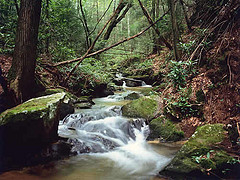Webinar examines Marcellus gas development and local water decisions
live.psu.edu/story/58188#nw69

The uses and values of water in Pennsylvania are changing because of Marcellus Shale gas development.
UNIVERSITY PARK, Pa. — A Web-based seminar sponsored by Penn State Extension will examine municipalities’ roles related to water use and protection in the face of burgeoning Marcellus Shale gas development in Pennsylvania.
The 75-minute webinar will begin at 1 p.m. on March 15. Presenters are Charles Abdalla, professor of agricultural and environmental economics in Penn State’s College of Agricultural Sciences, and Peter Wulfhorst, extension educator based in Pike County, who specializes in economic and community development.
The uses and values of water are changing in Pennsylvania as a result of the rapid development of the Marcellus Shale gas industry, according to Abdalla. These changes are affecting municipal governments’ roles and activities and local outcomes and impacts.
“For example, there has been a significant increase in the demand for water needed in the hydraulic fracturing of shale gas wells,” he said. “Public water suppliers, including municipally owned systems, are meeting this demand and at the same time generating sizable revenues through water sales.
“Also, some municipalities have generated new revenues by leasing their mineral rights to watershed lands that supply water to their reservoirs and customers.”
Abdalla noted that the webinar will address three topics: water sales, leasing of municipally owned watershed lands and municipalities’ potential role in regulating land use to protect water.
“My webinar presentation will provide an overview of what we know — and don’t know — about these municipal activities, and existing and potential future issues.”
Wulfhorst will discuss the environmental safeguards that may be available under Pennsylvania law to help municipalities protect water.
“Specifically, I will cover the notification changes for both host municipality and adjacent municipality and landowners, and the requirement of a water-management plan not to adversely affect the quantity and quality of water resources,” he said.
“Also, I will review the increase in well-location restrictions for existing buildings, water wells, wetlands, public water supplies and streams, and I will discuss rules under which gas operators will be presumed to be responsible for water-supply pollution.”
The webinar is part of a monthly series of online workshops that provide education about the opportunities and challenges related to the state’s Marcellus Shale gas boom. Information about how to register for the session is available on the webinar page of Penn State Extension’s natural-gas website at http://extension.psu.edu/naturalgas/webinars.
Previous webinars, publications and information also are available on the Penn State Extension natural-gas website (http://extension.psu.edu/naturalgas), covering topics such as Marcellus gas development’s impact on transportation systems; seismic testing; air pollution from gas development; the gas boom’s effect on landfills; Marcellus gas water use and quality; zoning; gas-leasing considerations for landowners; implications for local communities; gas pipelines and right-of-way issues; legal issues surrounding gas development; and the impact of Marcellus gas development on forestland.
For more information, contact John Turack, extension educator based in Westmoreland County, at (724) 837-1402 or by email at jdt15@psu.edu.
